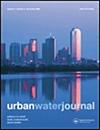Assessing water use and reuse options - a holistic analysis of a Model City, coupling dynamic system modelling with Life Cycle Assessment
IF 1.6
3区 环境科学与生态学
Q3 WATER RESOURCES
引用次数: 0
Abstract
ABSTRACT A dynamic model, fed with time-variant inputs, of the entire water urban system, coupled with Life Cycle Assessment (LCA) and Life Cycle Costing (LCC), was developed and applied to perform water balance analysis and to assess the environmental and economic aspects of water reuse. Six scenarios using different water sources potable water, rainwater, greywater, and treated wastewater were compared for a future Model City under typical Israeli conditions. The integrated dynamic simulation-LCA-LCC approach considers demands for several water resources and their availability, contains several feedback loops in the water system, and can be applied to any case study. Finally, the combined simulation-LCA-LCC was embedded into an optimisation framework. Results indicate that using treated greywater or treated wastewater for non-potable uses were the most economical scenarios. Business-as-usual scenario, where all urban water functions use potable water, displays the largest negative environmental impacts in all categories compared to using alternative water sources.评估水的使用和再利用方案——对模型城市的整体分析,将动态系统建模与生命周期评估相结合
摘要开发了一个包含时变输入的整个水-城市系统的动态模型,结合生命周期评估(LCA)和生命周期成本计算(LCC),并将其应用于水平衡分析和水再利用的环境和经济方面的评估。在典型的以色列条件下,对未来模范城市使用不同水源——饮用水、雨水、灰水和处理过的废水的六种情景进行了比较。综合动态模拟LCA-LCC方法考虑了对几种水资源的需求及其可用性,包含了水系统中的几个反馈回路,可应用于任何案例研究。最后,将组合仿真LCA-LCC嵌入到优化框架中。结果表明,将经处理的灰水或经处理的废水用于非饮用用途是最经济的方案。与使用替代水源相比,所有城市供水功能都使用饮用水的照常营业场景在所有类别中显示出最大的负面环境影响。
本文章由计算机程序翻译,如有差异,请以英文原文为准。
求助全文
约1分钟内获得全文
求助全文
来源期刊

Urban Water Journal
WATER RESOURCES-
CiteScore
4.40
自引率
11.10%
发文量
101
审稿时长
3 months
期刊介绍:
Urban Water Journal provides a forum for the research and professional communities dealing with water systems in the urban environment, directly contributing to the furtherance of sustainable development. Particular emphasis is placed on the analysis of interrelationships and interactions between the individual water systems, urban water bodies and the wider environment. The Journal encourages the adoption of an integrated approach, and system''s thinking to solve the numerous problems associated with sustainable urban water management.
Urban Water Journal focuses on the water-related infrastructure in the city: namely potable water supply, treatment and distribution; wastewater collection, treatment and management, and environmental return; storm drainage and urban flood management. Specific topics of interest include:
network design, optimisation, management, operation and rehabilitation;
novel treatment processes for water and wastewater, resource recovery, treatment plant design and optimisation as well as treatment plants as part of the integrated urban water system;
demand management and water efficiency, water recycling and source control;
stormwater management, urban flood risk quantification and management;
monitoring, utilisation and management of urban water bodies including groundwater;
water-sensitive planning and design (including analysis of interactions of the urban water cycle with city planning and green infrastructure);
resilience of the urban water system, long term scenarios to manage uncertainty, system stress testing;
data needs, smart metering and sensors, advanced data analytics for knowledge discovery, quantification and management of uncertainty, smart technologies for urban water systems;
decision-support and informatic tools;...
 求助内容:
求助内容: 应助结果提醒方式:
应助结果提醒方式:


